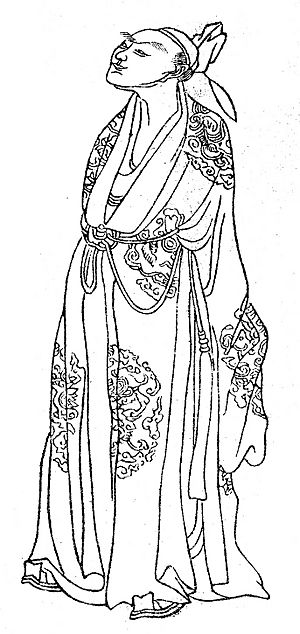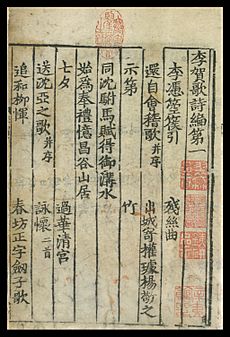Li He facts for kids
Quick facts for kids
Li He
|
|
|---|---|
| 李賀 | |

Li He, as depicted in the 1743 book Wanxiaotang Zhuzhuang Huazhuan (晩笑堂竹荘畫傳).
|
|
| Born | 790/791 Yichang County, Henan, China
|
| Died | 816 (aged 25–26) 817 (aged 25–26) Yiyang County, Henan, China
|
| Occupation | Poet |
| Chinese name | |
| Traditional Chinese | 李賀 |
| Simplified Chinese | 李贺 |
| Hanyu Pinyin | Lǐ Hè |
| Wade–Giles | Li3 Ho4 |
| Courtesy name: Changji | |
| Traditional Chinese | 長吉 |
| Simplified Chinese | 长吉 |
| Hanyu Pinyin | Chángjí |
| Nickname: Shigui | |
| Traditional Chinese | 詩鬼 |
| Simplified Chinese | 诗鬼 |
| Literal meaning | Ghost of Poetry |
| Hanyu Pinyin | Shīguǐ |
| Nickname: Guicai | |
| Chinese | 鬼才 |
| Literal meaning | Spectral Talent |
| Hanyu Pinyin | Guǐcái |
Li He (c. 790–791 – c. 816–817) was a famous Chinese poet from the Tang dynasty. He lived during the middle part of the Tang dynasty. His special name, called a courtesy name, was Changji. People also knew him by the nicknames Guicai (meaning "Spectral Talent") and Shigui (meaning "Ghost of Poetry").
Li He was very dedicated to his writing. He would go out during the day, and whenever a new line of poetry came to him, he would quickly write it down. Then, when he got home in the evening, he would finish his poems. His poems are famous for exploring themes that are ghostly, supernatural, and fantastic.
Sadly, he died very young, at only 26 or 27 years old. He was known for looking quite sickly. Because of a rule about names, he was not allowed to take an important test called the imperial examination. This test was usually how people got important jobs in the government.
Over the centuries, how popular Li He was changed a lot. His unique style of poetry was often copied in China for a long time. However, during the Qing dynasty, people's tastes in poetry changed. His poems were even left out of a very important collection called Three Hundred Tang Poems. But in the 1900s, people became interested in his work again. He was even one of the Tang poets that Mao Zedong admired the most.
Contents
Li He's Life Story
Early Life and Family
Li He was born in 790 or 791. He came from a family that was distantly related to the royal family of the Tang Dynasty. However, his family's wealth and power had decreased a lot over time. By the time Li He was born, they were not very high-ranking.
He was born in a place called Fuchang County, which is now part of Yiyang County in Henan Province. He started writing poetry when he was only 7 years old! By the time he was about 15, people were already comparing him to a famous poet named Li Yi.
Why He Couldn't Take the Exam
When Li He was 20, he wanted to take the Imperial Examination. This was a very important test that could help him get a good job in the government. But he was stopped because of a "naming taboo."
A naming taboo meant you couldn't use a word that sounded the same as a character in your father's name. The first character of his father's name sounded like the first character of the degree he would get if he passed the exam. Some people think this was just an excuse made by others who were jealous of his poetry skills.
A famous writer named Han Yu admired Li He's poems and tried to help him. But Li He was still not able to take the exam. He only worked for three years in a low-ranking government job before he went back to his hometown.
Sickness and His Final Days
People described Li He as looking very thin and sickly. They said he had a unibrow and let his fingernails grow long. He died as a low-ranking and poor official in 816 or 817, when he was only 26 or 27 years old.
A story says that when he was dying, a figure dressed in red came to him. This figure told Li He that the great god Shangdi had called him to heaven to write poetry there.
His Special Names
Li He's courtesy name was Changji. Sometimes people called him Li Changji, combining his family name and courtesy name.
He was also known as Guicai (鬼才), which means "devilish talent" or "spectral talent." This name was used to show how different his dark and unusual poetry style was compared to other poets. For example, Li Bai was called Tiancai (天才), "heavenly talent," and Bai Juyi was called Rencai (人才), "humanly talent."
Another nickname he had was the "Ghost of Poetry" (詩鬼). In comparison, Li Bai was called the "Immortal of Poetry" (詩仙), and Du Fu was called the "Sage of Poetry" (詩聖).
Li He's Poetry
Li He is considered a poet of the "Middle Tang" period, which was from the late 700s to the early 800s. Other poets who influenced him included Meng Jiao and Han Yu. He was also inspired by old shamanistic poems and the unique style of Li Bai.
About 240 of his poems are still around today. An old book says that not many of his poems survived because they were so strange and because he died so young. There's a story that one of Li He's cousins was asked to collect his poems, but because he didn't like Li He, he threw the collected poems away!
We have two main collections of his poems: the Collected Songs and Verses of Li He and the Wai Ji.
The story of his life says he was a very hard-working poet. He would carry an old bag with him. Whenever a line of poetry came to his mind, he would quickly write it down and put it in the bag. When he got home, he would take out all the lines and put them together to make a poem.
His poetry is truly one-of-a-kind. It's full of amazing and unusual images, which is why he got the nickname "Guicai" (spectral talent). Most of his poems don't follow the usual strict rules of Chinese poetry. He often used words that might seem a bit sad or spooky, like "aging" (Chinese: 老; pinyin: lǎo) and "death" (Chinese: 死; pinyin: sǐ). In poems like "Tianshang yao," he wrote vividly about the worlds of gods and Buddhas.
| 夢天 Traditional |
Mèng Tiān Pinyin |
"Sky Dream" English translation |
|---|---|---|
|
|
|
He also wrote spooky descriptions of the world of ghosts in poems like "Qiu lai" and "Shen xian qu." The spiritual symbols he used in "Shen xian qu" can be quite hard to understand. "Shen xian qu" was also the name of an old folk song. Li He's poem uses the same name, but his poem describes a supernatural world, which was different from the original folk song.
Li He often mixed colors and feelings in his poetry. You can see this in "Tianshang yao" (above) and "Qin wang yin jiu."
| 秦王飲酒 Traditional |
Qín Wáng Yǐn Jiǔ Pinyin |
"The King of Qin Drinks Wine" English translation |
|---|---|---|
|
|
|
Later critics called his poetic style Changji-ti (simplified Chinese: 长吉体; traditional Chinese: 長吉體; pinyin: cháng jí tǐ), named after his courtesy name. A famous writer from the Song Dynasty said that this was one of the unique styles of poetry that many people tried to copy.
See also
 In Spanish: Li He para niños
In Spanish: Li He para niños
 | Anna J. Cooper |
 | Mary McLeod Bethune |
 | Lillie Mae Bradford |


